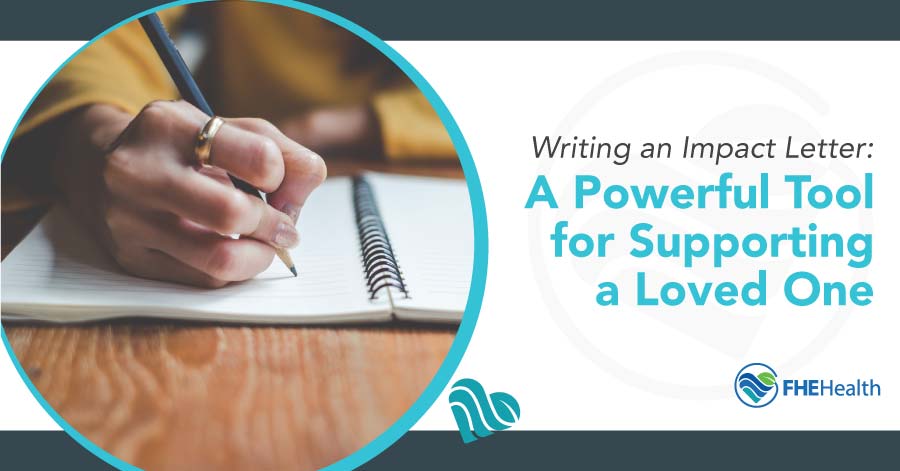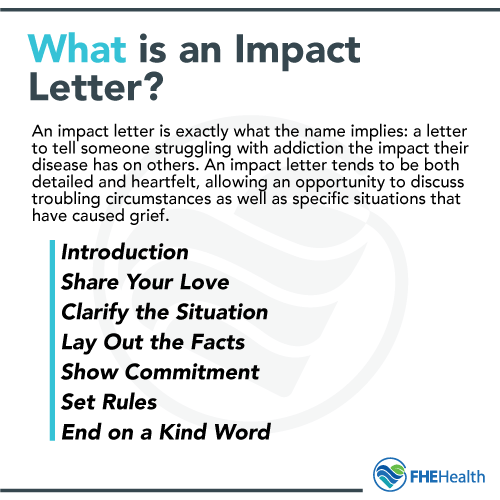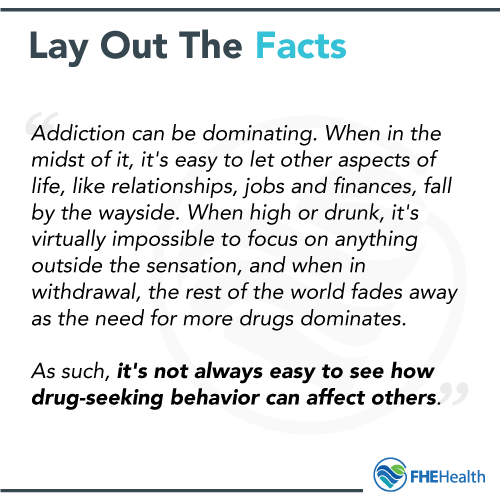
Updated May 31, 2023
When you have a loved one facing addiction, it’s not always easy to vocalize your feelings. The pain, stress and pressure that come with watching someone you care about slowly spiral out of control are agonizing, and there’s no good way to reveal your feelings without being met with anger or defensive behavior.
When it appears there is no resolution in sight, an intervention may seem like the only possible opportunity to communicate the real nature of a situation. This is rarely easy on the subject of an intervention; many may feel attacked or under immense pressure to act, but seeing the effects negative behavior has on friends and family may be the only measure that makes a difference.
Finding the right words, particularly when conveying heartfelt emotions to someone’s face, can get very hard, very quickly, leading to a troubled intervention without the proper preparation. As such, an impact letter, or a letter summarizing the effects of addiction on both you and your larger social circle, is highly recommended. Below you’ll find more information about an impact letter, tips for how to write one, and, as further inspiration, a sample letter.
What Is an Impact Letter?
 An impact letter is exactly what the name implies: a letter to tell someone struggling with addiction the impact their disease has on others. An impact letter tends to be both detailed and heartfelt, allowing an opportunity to discuss troubling circumstances as well as specific situations that have caused grief.
An impact letter is exactly what the name implies: a letter to tell someone struggling with addiction the impact their disease has on others. An impact letter tends to be both detailed and heartfelt, allowing an opportunity to discuss troubling circumstances as well as specific situations that have caused grief.
For example, if your child is living with an addiction and has stolen money from you, lied to you about substance abuse or betrayed your trust in other ways, an impact letter is a good way to explain the ramifications of these events. While the subject of the intervention is obviously aware something like a theft occurred, they may not understand the true extent of a problem, for example, if you were unable to pay rent or buy groceries due to missing money.
An impact letter is designed to impress the reality of the situation upon the subject but isn’t intended to be manipulative, mean or patronizing. Cruelty doesn’t inspire positive action, so despite the potentially negative feelings associated with addiction, an impact letter should be sympathetic and supportive, not an opportunity to lay into an already challenged individual.
How to Write an Impact Letter
Impact letters can take numerous forms depending on the situation at hand, but in order to maximize efficacy, a specific template is recommended.
Introduction
In the introduction of a letter, state who you are and your relationship to the subject of an intervention. Describe the person in your own words that relate to how you view them — both before and after addiction — as well as what your relationship means.
It’s okay to be complimentary; addiction doesn’t erase all good traits or turn a good person into a bad person. If there have been recent fights related to addiction, for example, using kind words can soften the blow of what is to come while reaffirming that previous bonds are still there.
Share Your Love
Interventions are generally intimate moments with only closely affected family members and friends in attendance, so sharing how you feel is normal and expected. Tell the individual how much you love them, how much their presence has enriched your life, and why they matter so much.
It’s okay to be as open and honest as you’d like and feel free to explain specific traits or moments that exemplify your feelings. Be sure to specify that your love is unconditional. As a parent, child, spouse, partner or friend, your affection shouldn’t rely on any particular set of criteria, and it’s important your loved one knows this.
Don’t be overly flattering or insincere in your letter; this is not helpful, and your lack of sincerity will likely come across to the subject of an intervention. If you have faced a tumultuous relationship as a result of drugs or alcohol, try to think back to a happier time when addiction wasn’t standing in the way.
Clarify the Situation
Many people living with addiction feel great shame as a result of their habits, so before you begin speaking about particular problems associated with addiction, be clear about your understanding of addiction as a disease. Explain that you know that addiction can happen to anyone and that falling victim to addiction is not a sign of weakness or a personal failing.
Hearing these realities can help the subject of an intervention to feel less guilt or blame while facing their challenges; without finger-pointing, they can be free to accept their situation as a turn of events rather than a sign that they are not a good or worthy person.
Lay Out the Facts
 Addiction can be dominating. When in the midst of it, it’s easy to let other aspects of life, like relationships, jobs and finances, fall by the wayside. When high or drunk, it’s virtually impossible to focus on anything outside the sensation, and when in withdrawal, the rest of the world fades away as the need for more drugs dominates.
Addiction can be dominating. When in the midst of it, it’s easy to let other aspects of life, like relationships, jobs and finances, fall by the wayside. When high or drunk, it’s virtually impossible to focus on anything outside the sensation, and when in withdrawal, the rest of the world fades away as the need for more drugs dominates.
As such, it’s not always easy to see how drug-seeking behavior can affect others. By presenting the facts of how addiction has affected your life and your relationship, you can demonstrate the little details that may otherwise be missed while the intervention subject is in the depths of addiction.
In preparing your letter, think about the ways in which facing addiction has changed your life and the life of your loved one. Have you witnessed job losses? The end of romantic relationships? Repossessed cars? Homelessness or financial struggles? All of these things may seem par for the course for those in active addiction but will stand out as red flags to those on the outside looking in.
Be sure that this section does not become an exhaustive list of every large and small grievance you have that relates to addiction. While you may have dozens of examples to share, going too far in depth can begin to feel like a bashing session, and this diminishes the effectiveness of your objective. Instead, focus on the most meaningful and significant examples that are likely to have the maximum impact.
Show Commitment
If you want to encourage an addict to get help, you need to be willing to demonstrate what you will do to support these endeavors. Maybe you’ll go to Al-Anon meetings, accompany your loved one to AA, visit regularly during rehab or help with choosing the right program. When the subject of an intervention knows that help is available, making the choice to get assistance won’t feel so impossible.
Be sure that if you’re going to promise these things, you actually do them. If you say you will be a part of a user’s support system and fail to do so, your whole letter will be seen as a lie.
Set Rules
If you have previously been enabling addiction or providing a little too much sympathy for a disease in need of treatment, use this section to set boundaries. Explain what you will and won’t continue to do, like ceasing to provide housing if sobriety isn’t maintained or cutting off financial support until treatment is completed.
Someone living with addiction needs to know what they will be surrendering without getting help. You can be as strict or as lenient as fits your situation, but things like required program attendance and sobriety should be primary points in your restrictions.
End on a Kind Word
The intervention process is extremely stressful and emotional, so ending your letter with a description of the problems at hand and the rules you’re imposing may come off as unnecessarily harsh. Instead, use the conclusion of your letter to reaffirm your love, summarize your commitment and explain the importance of treatment.
When handled properly, an impact letter can expose a pattern of abuse while also establishing a sense of purpose in someone living with substance abuse. By following this template, you can check every box to ensure your letter sends the proper message and increases the likelihood of treatment.
Example of an Impact Letter
My child,
Though our relationship has been a bit strained recently, I want you to know no words could ever express how much you mean to me. No matter what happens, you will always be my child, and nothing could ever change how much I love you. Giving birth to you is one of the highlights of my life. The many happy memories you’ve given me are irreplaceable. I remember bringing you home from the hospital for the first time. I couldn’t believe that I was finally a mother. I just kept looking over at your chubby cheeks and pinching myself so I’d know it was real.
It wasn’t always easy, as you know. We’ve had our fair share of disagreements over the years. From little things like me barging into your room without knocking to the bigger stuff, like that time you “borrowed” my car to visit your friend after I told you you couldn’t go. But no matter how mad we got at each other, I knew that I would always love you and we would find our way back.
It’s because I know that we will always be connected that I’m writing this letter. Ever since you were in that car accident, I know you’ve been abusing your prescription pain meds. I can’t possibly understand the fear and pain you felt in those terrifying moments—or what emotions you are experiencing now that cause you to want to keep taking more pills.
What I do understand—and need you to know—is how your painkiller problem has hurt me and our relationship. We used to talk on the phone every day. Now I’m lucky to get a text once a week, and it’s usually you asking for money. You don’t show up to family dinners or game nights anymore. One of the most important people in my life became a stranger to me.
Then there was that night you were driving under the influence and got into an accident. That call nearly destroyed me. Not only because I feared the worst for your health, but because you had become the very thing that had driven you to addiction in the first place. Ever since, I stay awake at night, dreading a call telling me you’ve hurt yourself or someone else.
I know addiction is a disease and I know that you never wanted this to happen. I’ve been searching for any way I could help you and I mean any way. I will do whatever it takes to help you stay on the road to recovery. I will drive you to and from any Nar-Anon meetings. I will visit you every day in rehab. But I can no longer financially support you, knowing what the money is going toward. I can’t be the one to bail you out after something goes wrong.
I hope that you see this letter as I do: a hand reaching out to help. You are strong enough to make it through this and I know that our relationship can withstand anything. All I ask is that you let me—and the many others who care for you—help you.
I love you,
Mom
For more support and information about how to intervene when a family member or loved one faces addiction, reach out to us at FHE Health. Our counselors are available 24/7 and would be glad to be of assistance.









